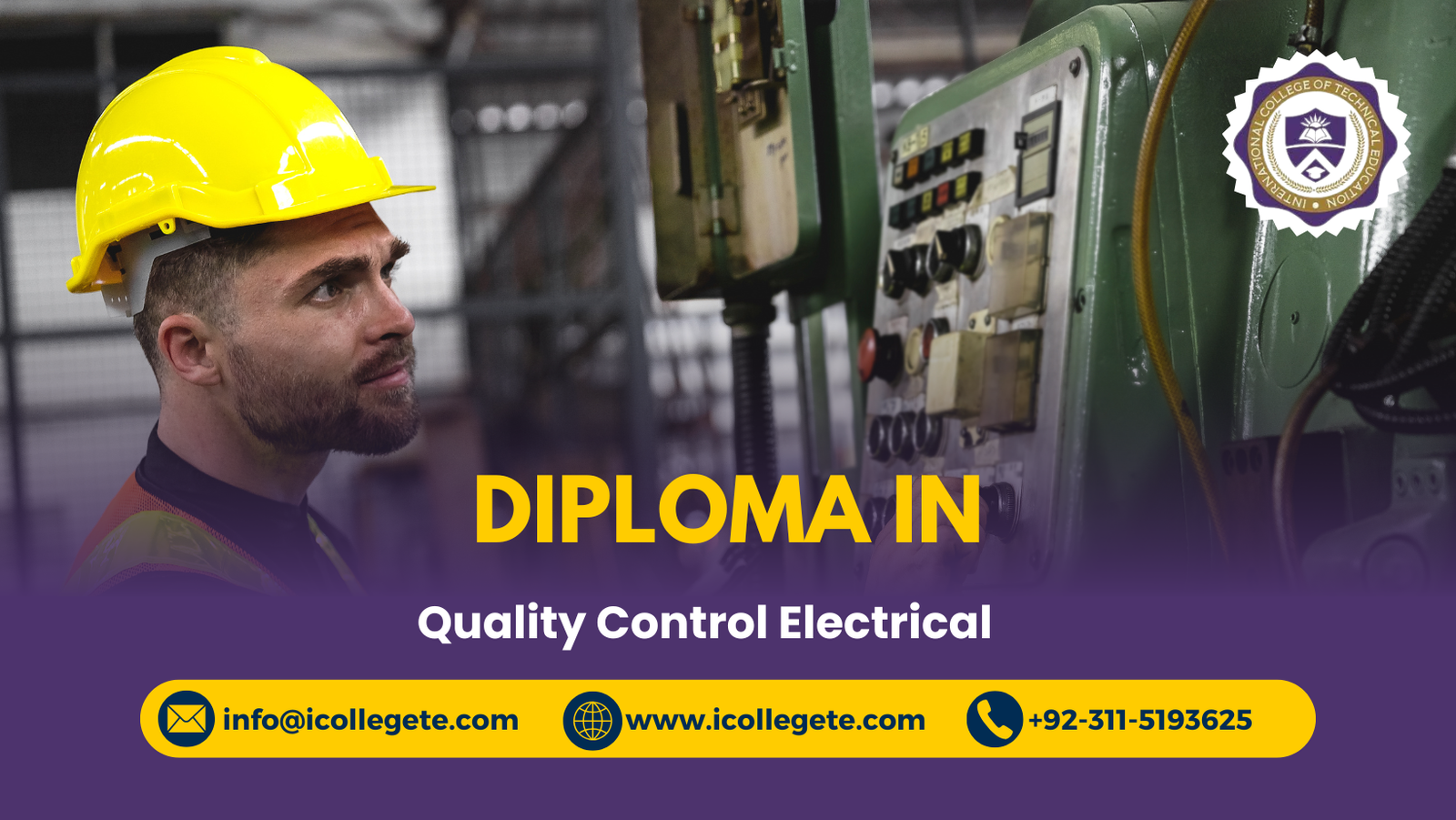The Diploma in Quality Control Electrical is a specialized program designed to train students in the principles and practices of electrical quality assurance. This course focuses on ensuring that electrical systems, equipment, and installations meet industry standards, safety regulations, and performance requirements.
Learners will gain knowledge in electrical testing methods, inspection techniques, fault diagnosis, and compliance with international quality standards. The program also emphasizes practical skills in monitoring, evaluating, and maintaining electrical systems to guarantee reliability and efficiency.
By completing this diploma, students become equipped to work in industries such as power generation, manufacturing, construction, and electrical maintenance. The course prepares graduates for roles like Quality Control Inspector, Electrical Technician, Testing Engineer, and Compliance Officer, making it an excellent pathway for those aiming to build a career in the electrical and industrial sector.
The Diploma in Quality Control Electrical course is structured around several key study units, each designed to provide practical and theoretical knowledge needed in the field:
- Introduction to Electrical Quality Control:
- Overview of electrical systems and components.
- The role and importance of quality control in the electrical industry.
- Electrical Safety Standards and Regulations:
- Understanding the importance of safety standards and codes (e.g., IEC, NEC).
- Key electrical safety practices to follow in installations and maintenance.
- Electrical Inspection and Testing Techniques:
- Techniques for inspecting electrical components, circuits, and systems.
- Understanding common electrical testing methods (e.g., insulation resistance testing, continuity testing, voltage testing).
- Quality Assurance in Electrical Systems:
- Principles of quality assurance and control in the electrical industry.
- Procedures for maintaining and monitoring electrical systems’ quality throughout their lifecycle.
- Fault Detection and Troubleshooting:
- Techniques for diagnosing faults in electrical circuits and systems.
- Methods for repairing electrical faults and improving system performance.
- Electrical Materials and Components Testing:
- Testing of various electrical components such as switches, transformers, and circuit breakers.
- Understanding material properties and how they affect electrical system performance.
- Instrumentation and Measurement Tools for Electrical Testing:
- Overview of tools used for electrical measurement and testing (multimeters, oscilloscopes, thermographic cameras).
- How to use these tools effectively for quality control.
- Documentation and Reporting:
- Best practices for recording and documenting electrical inspections and test results.
- How to prepare and present quality control reports.
- Standards for Electrical Design and Installation:
- Review of design principles and installation practices for electrical systems.
- Ensuring electrical installations comply with relevant standards and codes.
- Case Studies and Practical Applications:
- Real-world examples and case studies to understand how electrical quality control is implemented in different industries.
- Hands-on training with electrical systems and equipment to apply theory in practical scenarios.
Upon completing the Diploma in Quality Control Electrical, students will be able to:
- Understand Quality Control Processes: Gain a comprehensive understanding of the quality control processes used in the electrical industry, including inspections, tests, and compliance with safety standards.
- Perform Electrical Testing: Learn how to conduct tests on electrical systems and components to ensure they meet the required specifications and safety standards.
- Evaluate Electrical Systems: Develop the ability to assess the performance of electrical systems and identify potential areas for improvement or failure.
- Follow Industry Standards and Regulations: Understand and apply national and international quality standards, safety regulations, and codes of practice in electrical systems.
- Identify and Troubleshoot Electrical Faults: Learn how to effectively identify and troubleshoot electrical faults, minimizing downtime and ensuring system efficiency.
- Ensure Electrical Safety: Understand electrical safety protocols and the importance of quality control in preventing accidents and enhancing the reliability of electrical systems.
- Document and Report Findings: Learn to document and report findings, maintaining accurate records of quality control tests and inspections.
The Diploma in Quality Control Electrical offers a wide range of benefits that make it an excellent choice for aspiring electrical professionals:
- High Demand for Skilled Technicians: Electrical systems are integral to nearly every industry, and skilled quality control professionals are highly sought after to ensure these systems perform safely and efficiently.
- Industry-Relevant Knowledge: The course provides up-to-date knowledge on electrical safety standards, testing procedures, and quality assurance practices that are essential for today’s electrical industries.
- Enhanced Career Opportunities: Graduates can pursue a variety of roles in industries such as construction, manufacturing, energy, and maintenance, with potential job titles such as Electrical Inspector, Quality Control Technician, and Electrical Maintenance Engineer.
- Practical Hands-On Experience: With an emphasis on practical applications and real-world scenarios, this course ensures that graduates are ready to handle the challenges of electrical systems in any environment.
- Improved Safety and Efficiency: Quality control is crucial to minimizing risks, reducing system failures, and ensuring optimal performance of electrical systems, which can help prevent costly repairs and accidents.
- Competitive Edge in the Job Market: The qualification adds value to your resume, demonstrating your expertise in quality control and electrical systems, making you stand out in the competitive job market.
The Diploma in Quality Control Electrical is ideal for individuals interested in pursuing a career in the electrical engineering field, especially those looking to specialize in quality control. The course is suited for:
- Aspiring Electrical Technicians: If you want to become an electrical technician with a focus on quality control, this diploma will equip you with the essential skills needed for success.
- Current Electrical Engineers or Technicians: Those already working in the electrical industry can enhance their skills and knowledge, opening doors to new roles and career advancement.
- Quality Assurance Professionals: Individuals in quality assurance or control roles who wish to specialize in the electrical sector and develop expertise in electrical systems.
- Students with a Technical Background: Those with a background in electrical or mechanical engineering looking to specialize in quality control and testing within the electrical industry.
- Industry Professionals: Those working in fields such as construction, manufacturing, or energy who need to understand the principles of electrical quality control to ensure safety and efficiency in their work.









